17.12.2024
Joe Biden’s Visit to France: What Future for Transatlantic Cooperation?
Interview
10 juin 2024

For his first state visit of 2024, Joe Biden travelled to France, also his first since taking office. The five-day trip was marked by the 80th anniversary of the Normandy landings and a tribute to American veterans, but also by a major political agenda on Europe, multilateralism and the war in Ukraine. Emmanuel Macron hosted a sumptuous reception at the Élysée Palace on Saturday 9 June, during which the two men highlighted the close ties between Paris and Washington. What did the US President learn from his visit to France? What analysis can be made of Franco-American relations and transatlantic cooperation more generally? Marie-Cécile Naves, director of research at IRIS and a specialist in the United States, provides some answers.
Joe Biden and a number of European heads of state visited France to commemorate the 80th anniversary of the Normandy landings on 6 June 1944. Given the return of war to the European continent with the Russian-Ukrainian conflict, the presence of President Volodymyr Zelensky and the forthcoming G7 and NATO summits, how important is this event in terms of Washington’s commitment to its European allies?
It is important for these heads of state to tell and nurture a common story, one that draws on the lessons of the past and the strength of shared values. This is achieved through images, symbols and words that are performative. The parallel between the fight against Nazi Germany and the defence of freedom in Ukraine is part of this logic. Joe Biden, for example, says: ‘To look away from Ukraine would be to forget what happened here’. He is also addressing those countries around the world that do not understand the West’s support for Ukraine against Russia, and who see this policy as a double standard when compared to the policy in Gaza. France and the United States also have something in common: the far right is (more than ever in France) on the doorstep of power.
In parallel with this event, Joe Biden held talks with Emmanuel Macron as part of a state visit. What is the state of relations between Paris and Washington? How does this relationship translate into major international issues, such as the Israeli-Palestinian conflict?
A five-day State visit is a big deal for the American President in the middle of an election campaign. It’s a profound mark of respect. This visit is the reciprocal of Emmanuel Macron’s state visit to Washington in December 2022. But beyond the friendship between the two countries and the understanding between the two men, there are many geopolitical issues that are the subject of great tension: protectionism, the defence of green industries and electric cars, competition with China, and of course the outcome of the war in Ukraine and the conflict between Israel and Hamas where there are disagreements, far from it, for example on the recognition of the creation of a Palestinian state and the timetable for this recognition.
What stage has been reached in the battle for the next presidency between Joe Biden and Donald Trump in the United States? To what extent could Donald Trump’s return to power weaken transatlantic relations?
Joe Biden advocates international partnerships, multilateralism (which does not prevent him, like all his predecessors, from always favouring US interests, as the persistence of protectionism attests), and dialogue. For him, there is no question of letting Europe down in the face of Vladimir Putin’s conquering ambitions. ‘He will not stop at Ukraine’, said the American president. Donald Trump has, we recall, promised to end the war in 24 hours, which is a way of saying that he will end support for Europe if he returns to power. On that point, the outlook is crystal clear.
Translated by Deepl.